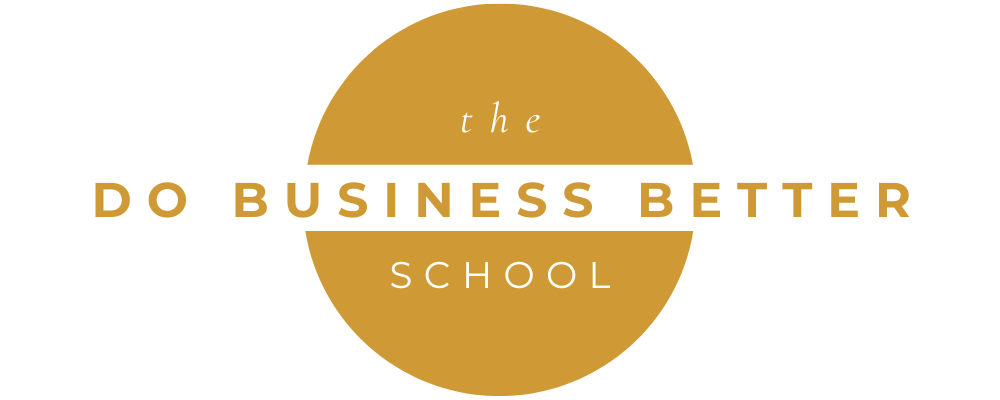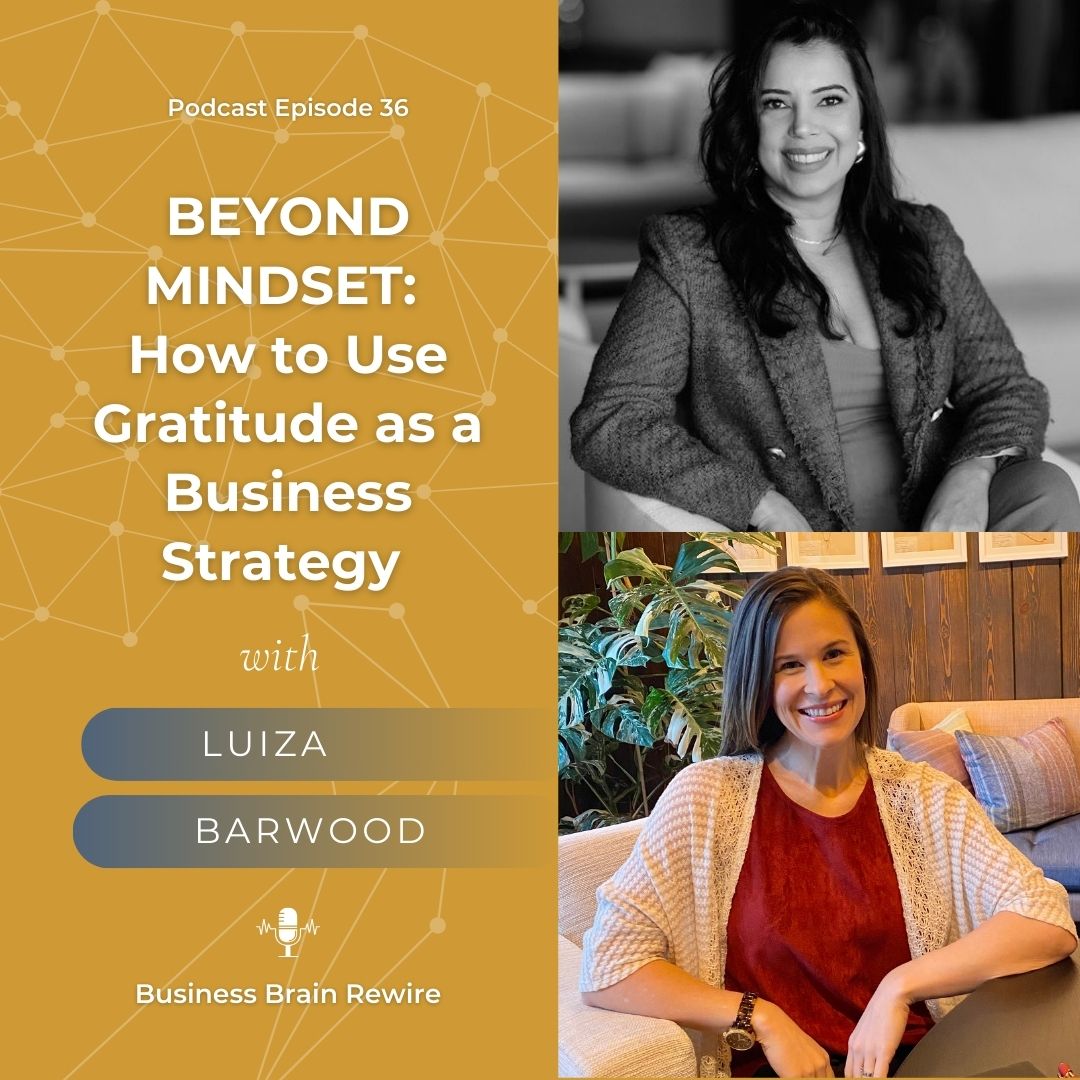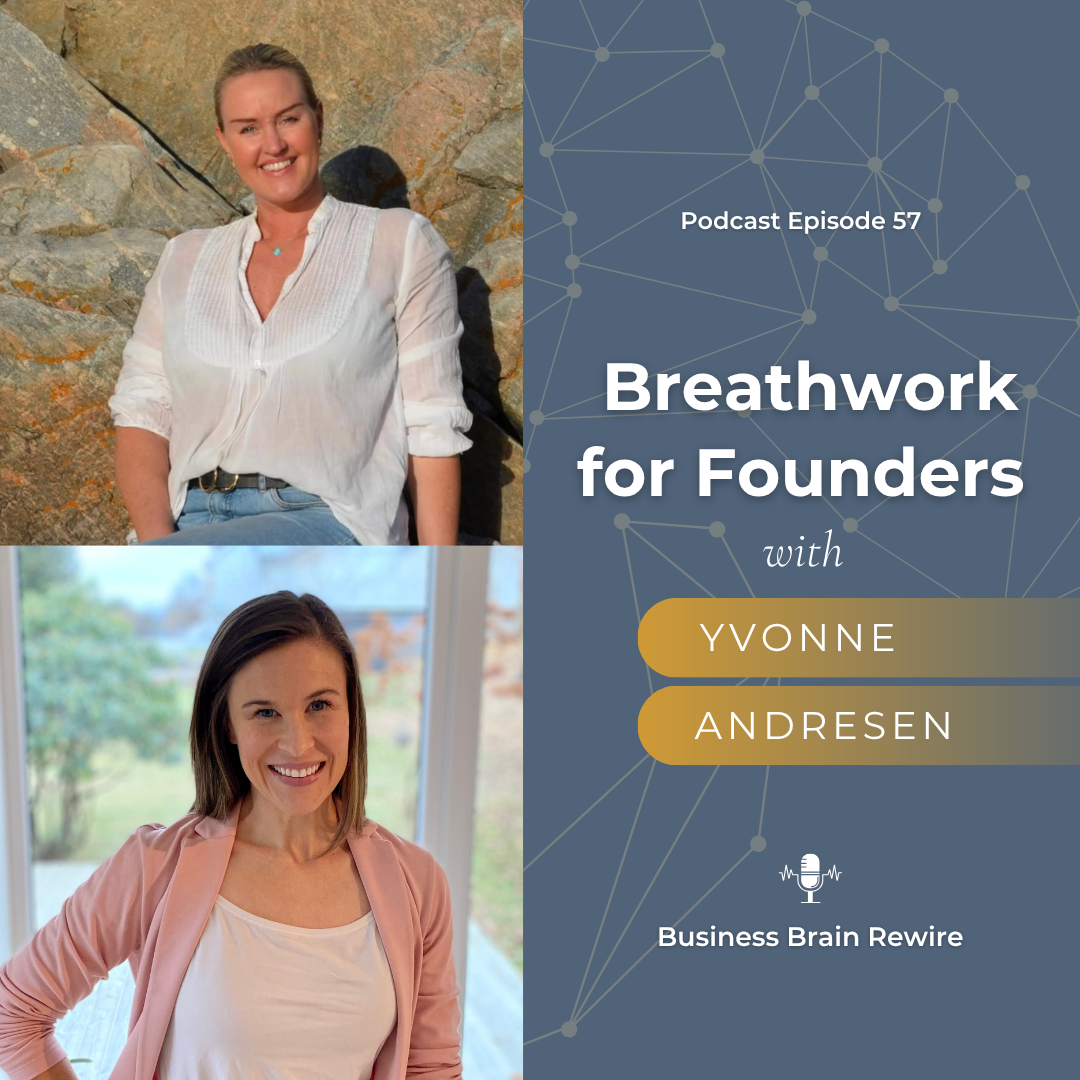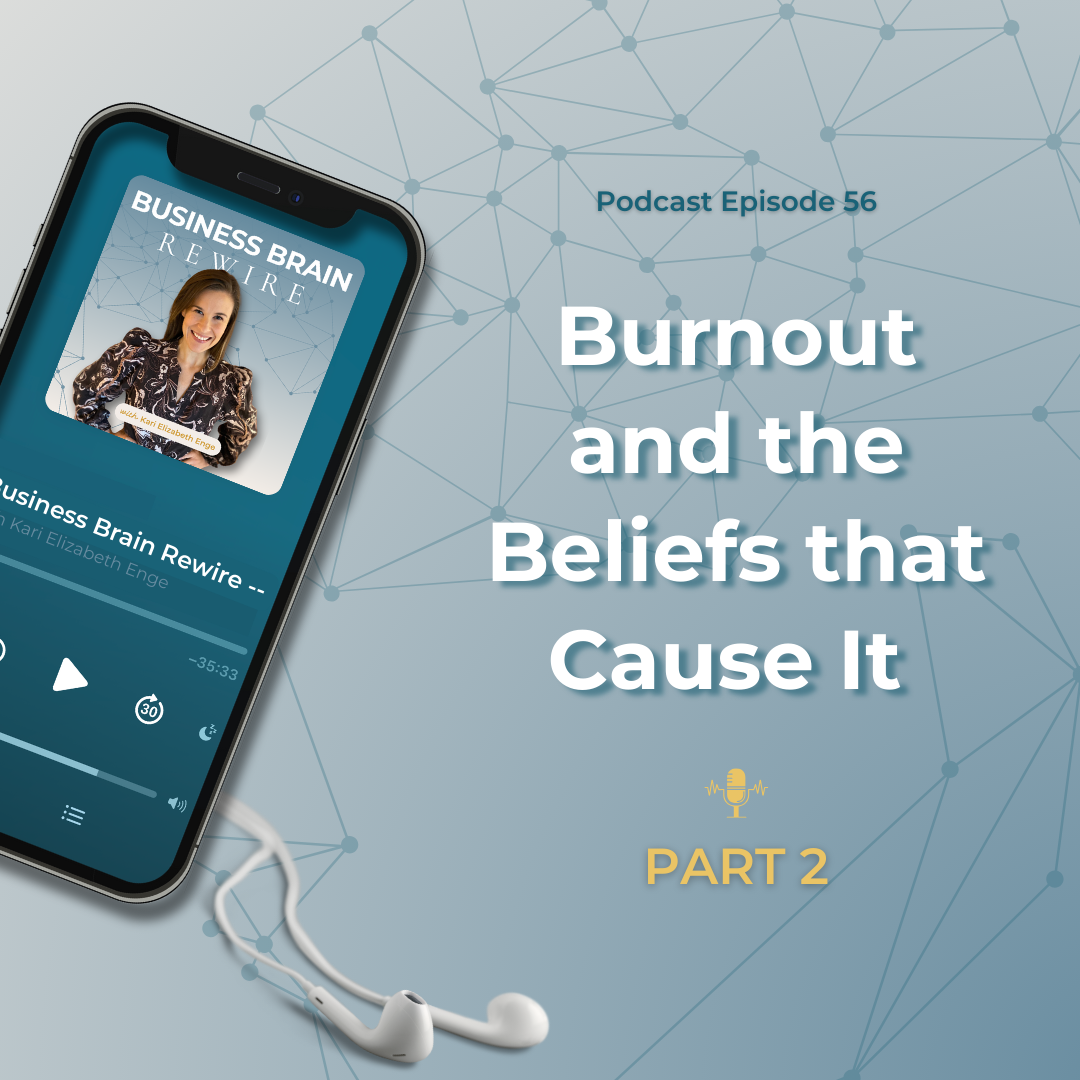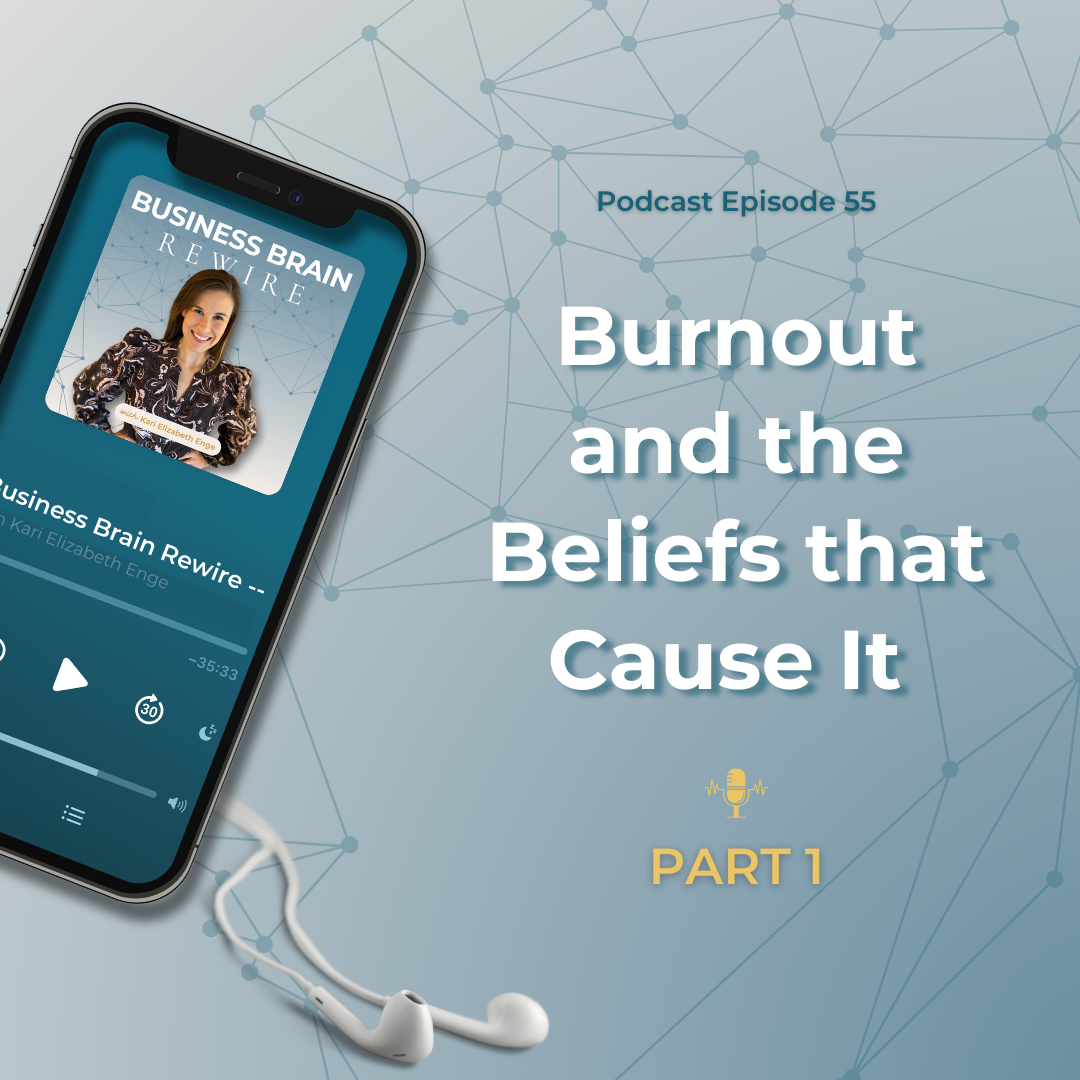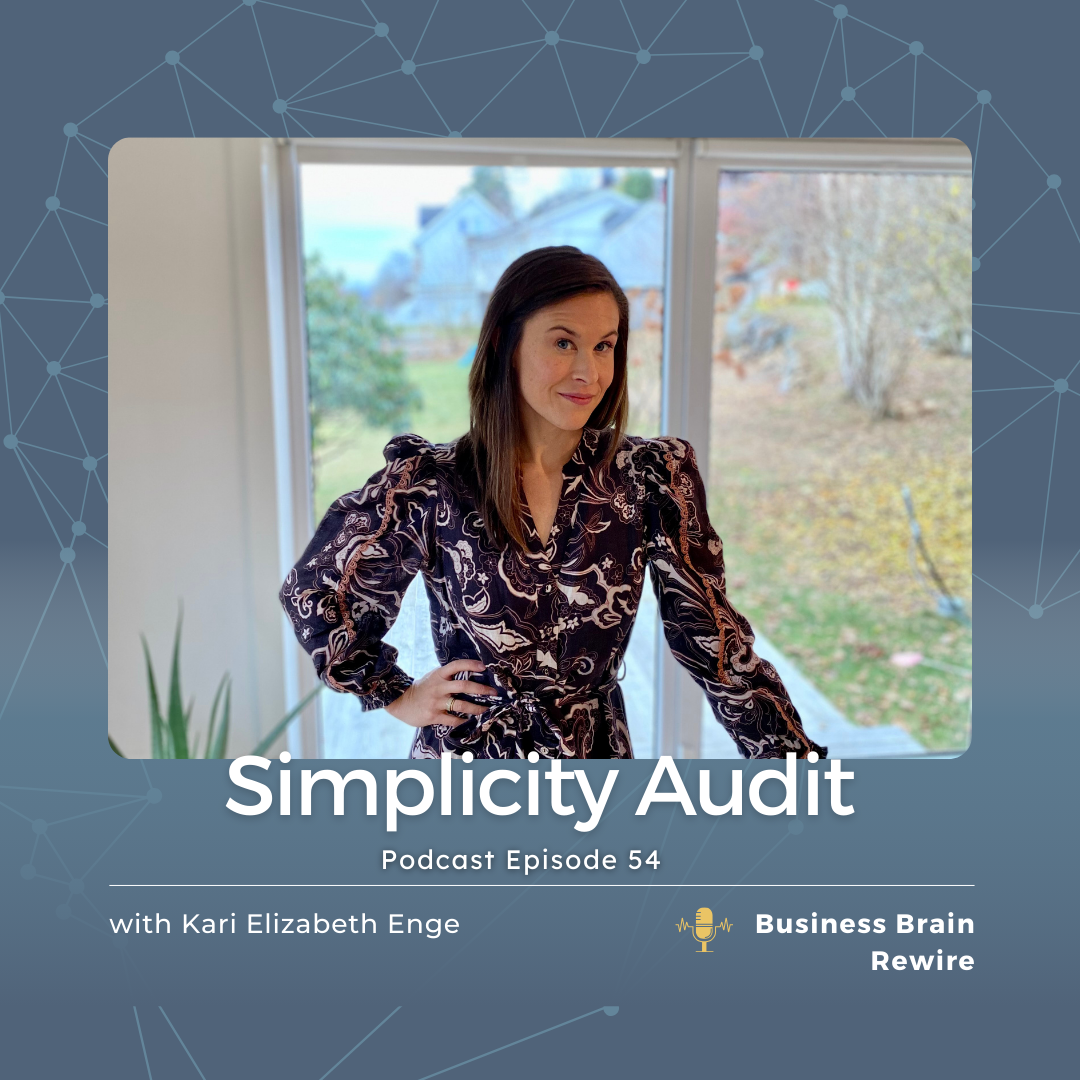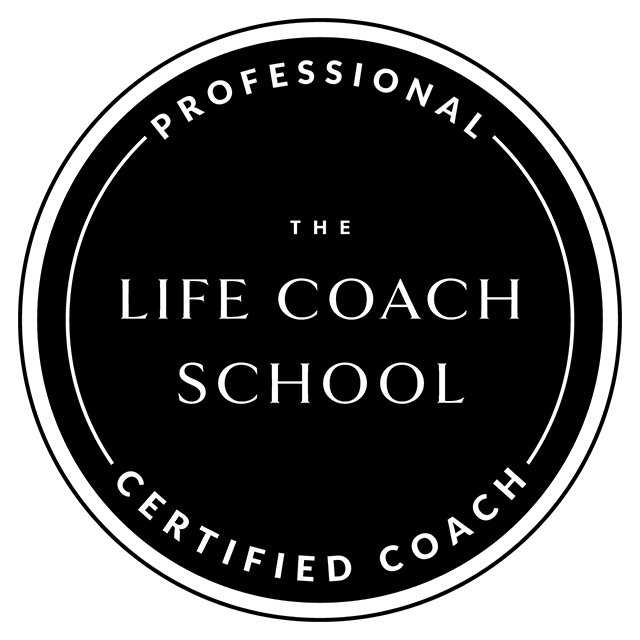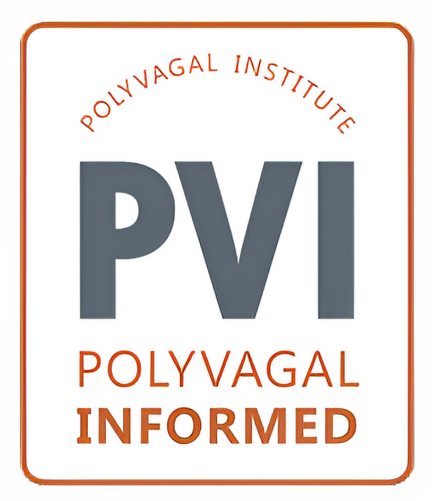When you think of gratitude, do you dismiss it as a “nice-to-have” rather than a core business tool?
What if I told you that gratitude isn’t just a feel-good practice—it’s a strategy that rewires your brain for better decision-making, problem-solving, and leadership?
In this episode of Business Brain Rewire, I sit down with Luiza Barwood, founder of Embrace Talent, who has spent over 15 years helping professionals build purpose-driven careers and personal brands. Luiza shares how gratitude—when used strategically—activates key areas of the brain, enhances resilience, and keeps founders in a peak performance state.
If you’ve ever felt overwhelmed by the ups and downs of entrepreneurship, this conversation is for you. We’ll talk about:
- The science behind gratitude and why it’s not just “woo” but a proven tool for better thinking.
- How practicing gratitude can snap you back into objectivity, making you a better decision-maker.
- Why gratitude is a must-have skill set for founders who want to grow a high-performing team.
- Simple ways to integrate gratitude into your daily routine—even if you’re skeptical.
This isn’t about toxic positivity or ignoring challenges. It’s about leveraging one of the most underrated and easiest mindset success strategies in business. Tune in and discover how to make gratitude work for you.
👉 Press play now.
In this episode, you’ll learn:
- The surprising way gratitude rewires your brain for smarter business decisions.
- How a simple gratitude practice can instantly shift you into problem-solving mode.
- The hidden link between gratitude and startup success that most founders overlook.
- A powerful gratitude-based leadership tool that transforms team dynamics and company culture.
Mentioned in today’s episode:
#1 Connect with Luiza Barwood on Linkedin
#2 If you loved this episode, then check out: Simply Sustainable.
You’ll learn a founder framework that helps you apply Lean Startup Principles in actual practice – so you move the needle faster with more ease. Plus, we add nervous system tools to the process (our secret sauce) so you are clear, confident, organized and growing your company while protecting your personal life and wellbeing.
Book a free consult call now, to see if it’s right for you and your company.
#3: Every Wednesday, I share a neuroscience-based strategy to grow your company that you won’t find anywhere else. Subscribe to get access to the systems you need for sustainable success.
Transcript:
[00:00:00] Hello founders and welcome to today’s show. Today I have another interview for you. We’re going to be talking to Louisa Barwood and we’re going to be diving into a very interesting topic that I don’t talk about a lot, but I think it is so important to create an episode all about it on business brain rewire because of how strategic it actually is.
[00:01:11] We are going to be hearing from Louisa Barwood, the founder of embrace talent, where she uses her 15 years of experience in talent management and as a talent consultant to help individuals to find careers with more purpose and authenticity. To help them to really build their personal brands. And one of the things that Louisa uses with her clients and that she has used for many years in the corporate world is gratitude. Gratitude is so strategic from so many different angles. It’s not just something that’s nice. It’s not just, a woo mindset. It is actually part of your strategy. If you know how to use it, when you strategize. It turns on and activate certain parts of the brain and changes the way you think and the way you problem solve. That’s why I wanted to bring Louisa on today to talk all about this topic. So without further ado, here’s my interview with Louisa barwood about gratitude.
[00:02:18] Welcome to the show, Luisa.
[00:02:22] Hi, Kari. I’m delighted to be here. Thank you so much for inviting me to join you.
[00:02:28] Yes. I’m so excited to have you on today’s show. We have been talking for a couple of months about this topic of gratitude, which we’re going to dive into today. So thank you so much for joining me. I hope that the sun does not interfere with today’s recording, but I wanted to show everybody my beautiful background. We have gorgeous sun, gorgeous snow today in Oslo. It’s not always the case. So I wanted this to be our backdrop today, and I will definitely post some video recordings of this episode on our Instagram. So make sure you guys check that out so you can see this beautiful backdrop of today. But to get started, Louisa, I would love for you to share just about who you are, where you’re from, what you do, so everyone can get acquainted with you.
[00:03:14] Absolutely. I’m super grateful to be here. As you said, beginning of the year, always good to add the gratitude spin. I am a career coach and talent consultant. I was in the corporate world for over 15 years in talent management on a global scale. And last year I decided to set up my own consultancy and gratitude aligned with me because one of the pillars of my coaching program is based on gratitude. Gratitude changed my life and I’m delighted to be here to be able to discuss it’s you know, benefits with you today.
[00:03:55] Yeah, I love gratitude as well. It’s such a powerful tool for founders. And I also just want to say welcome to the club. I was also a recovering corporate world woman who traveled around the world, like overworking in the corporate world. And entrepreneurship is just such a gift to be able to work on our terms and to make an impact in the world on our terms. So I’m just so glad you joined the club. Let’s start by talking just a little bit about the definition of gratitude because I think that a lot of people might not have ever defined it for themselves and that is a great starting point.
[00:04:33] Absolutely. I would say gratitude could be defined as a feeling or an attitude of appreciation, and it’s, you know, the ability to recognize the small things, and ultimately to understand that the small things, they make the difference. I think, you know, in recent years, there has been much more research, and there is a lot of empirical evidence out there, highlighting the benefits of gratitude in a way that can, you know, people can feel valued, motivated and ultimately encouraged to do the best work and to live the best lives in spite of all the setbacks and all challenges we all face on the way.
[00:05:20] Yes, I think it would be really helpful for everyone if we linked up to some of the neuroscience research for them, because I think that a lot of times when we talk about certain emotions in the business and professional world, gratitude may be being one of them. It can come across like, yeah, yeah, I know, I should feel gratitude, and yes, it’s kind of like a fluffy, soft thing or maybe even a woo woo type of spiritual tool, but it is definitely grounded in research and in neuroscience and there is a whole field of study in neuroscience just dedicated to gratitude. So we will link up to some of that so you can start to understand what’s going on professionally in the science world related to this. But let’s talk now about the benefits of gratitude. Gratitude is something that we know working with professionals and founders helps to build resiliency. So can you talk a bit about how gratitude can help expand a founder’s capacity and make them more resilient?
[00:06:28] Absolutely. I completely agree with what you said earlier. Especially like social media, if you use the hashtag gratitude, everyone is already rolling the eyes, isn’t it? But from a founder’s perspective from a resilience perspective, I think, you know, when you go down on the business path, yes, you have so many battles every day. Sometimes I think the main challenges founders have with, you know, the resilience is stepping back, reflecting, because, you know, you can, you have the challenges, but there are always the small wins. I think, you know, we tended to just look naturally. I think the way our brain is wired. We tend just to look at the negative side of everything, and I think the gratitude, you know, the small wins, even the setbacks when you are founder, you know, spinning 3000 plates at once is taking the step back and recognizing, you know, there’s more wins and also, the setbacks, if you own a path, but things they are not helping of flowing. Let’s say, how can you use the setbacks? How can you look at the bad stuff from a perspective of what this is teaching me? What can I take from it? I think in my own journey as well, even like my career in the corporate world or now, you know, as a founder, is looking at the small wins and appreciating what we have, not what is lacking, but how far you have come. And yeah, building the resilience from that, you know, trying to embrace everything you have been through, but looking with appreciation while feeling motivated by the small wins.
[00:08:14] Yeah. So I love what you’re saying. I think there’s just so much I want to respond to with what you’ve said. First of all, what I think is really helpful for founders and is in line with what you’re saying is it helps you to actually stay in the entrepreneurial mindset. It helps you to stay really objective. It helps you to evaluate. It helps you to keep going and continue to test and tweak without getting into this hopelessness or this frustration or this irritation, which can kind of derail you if you can’t manage it. Gratitude is one of those things that can just snap you back into a very objective mindset. Objectivity is not a soft skill. It’s a hard skill. It’s something that any masculine, you know, angel investor or any type of more traditional styled founder would say like, yes, objectivity and the lean startup mindset is important. But this soft skill, this maybe fluffy emotion or what sometimes founders think is fluffy of gratitude can actually be the portal to get back to objectivity. I love that you shared some examples of how this has helped you in real life. The other thing that I wanted to share is that the way that the vagus nerve is wired and we’ve talked a lot about or at least i’ve introduced the listeners to the vagus nerve here on the business brain rewire podcast and we’re going to be talking a lot more about it coming up, the way the vagus nerve is wired. You actually go into a different branch of the vagus nerve when you are in emotions, like these low vibrating emotions, like hopelessness or irritation or frustration or guilt or shame. And you go into a different branch when you are in things like joy, gratitude, inspiration. Where your whole physiology is more effective. You get into these founder peak performance states. So gratitude is so scientific and so useful in the business from so many different perspectives. Louisa, do you have any good or fun founder stories of how gratitude has helped a founder move forward in a difficult time or in a failure?
[00:10:45] Oh, yes. You already kind of touched on it, but , I always share as well as part of my program. The David Hawkins scale, all these low vibrating emotions like fear, helplessness, when you look at the scale and you see gratitude vibrating around 500, 540. Listeners, if you haven’t seen the David Hawkins Levels of Consciousness Scale, Google, it’s fascinating. People have this tool within themselves that enables them to change this feeling,
[00:11:21] Yeah. So what you’re saying is, is that it’s so easy to pay attention to, in your example, the bottom of this consciousness scale, these emotions that I teach as a nervous system state associated with either the fight flight state or the freeze shutdown state of the nervous system. It’s so easy for the, the human brain and body to just go in that direction, but coming into a more regulated, energized, almost play state, is available to us at any given moment if we just have the tools to shift. It can help us get right back into this entrepreneurial mindset. It’s so nice that you said, one of the questions that you ask is, what is this teaching me? I think that’s the essence of the mindset that I teach founders, which is that you’re always learning and picking something to optimize and then going and testing again, right? You’re always in this evaluation feedback loop. If you are able to access the right emotions like gratitude and to see those things that are right in front of you that you can learn from. So I hope that everyone listening is starting to get curious about gratitude. You have worked in a corporate world with teams for a long time. Let’s talk about leadership for a second and the team dynamic. A lot of founders, when they first start their companies, don’t realize that the biggest part of what they’re going to do, especially if they succeed is leadership and managing teams. They thought that they just had a great business idea and that they were going to work with their business idea and surprise, like 90 percent of what they do is leadership. How can gratitude help create the right startup culture? Let’s start with like that beginning year one through five company, how can a new founder use gratitude to build up the right startup culture?
[00:13:25] I would say, first of all, I think for leadership across the board, you cannot be a good leader if you don’t have a good of, you know, self knowledge, self awareness. Yes, I think the exercise starts with oneself. I think as a leader, it’s super important to look at your shadows and presence. Presence helps leaders, not in the past, not too much in the future, and it’s now. And recognizing and appreciating all the effort that your team is there for you, they are helping you to build your dream. What can you do from a cultural perspective since the beginning? What kind of culture do you want to create? Because, ultimately, as research says, when people are feeling, you know, valued, they are going to be more motivated, they are going to be delivering much more. I think it’s a matter of understanding what perspective do you want to take? The micromanagement, the nitty gritty, the annoying, you know, just looking at the bad side, or do you want to take the path that’s going to ensure your team is much more motivated? Okay. If there are mistakes, there are always going to be things to improve. But how do you phrase that? How do you approach people with that perspective, like, being grateful and ultimately being kind as well, right? Having this kind of energy, not ensuring that you create a safe space for your team for mistakes, for anything that happens, you know, showing that you were there to, you know, back them up, to support them as well. I think for every leader, looking, you know, the transformational side, it starts with yourself. You cannot be a great leader if you don’t do that work before on yourself and, you know, have this gratitude, this appreciation for the people. Success has to be shared. You are just gonna thrive, if you’re the people are thriving. It’s not just you, everyone has to win. That’s that’s how I see it.
[00:15:23] Yes, I have so many examples of founders who are caught up accidentally, obviously we don’t do this on purpose but accidentally in the fight flight stress response, just busy, we have to do as much as we can as fast as we can in this sense of urgency, which takes you out of presence. So it makes it very difficult to be patient and kind and to show appreciation for people around you when you’re stressed out, right? Because you’re just focused like a horse with blinders on of what’s right in front of you to solve. You’re not really empathetic or seeing from a bird’s eye view and thinking about how your team might be affected because of it. It can easily happen and awareness, like you said, is the number one tool for founders who are in a leadership role, who already have a team. Unless you are aware at what state you’re in, you can’t shift back into these regulated emotions, and therefore it’s going to be really hard for you to drive the bus and to get everybody moving toward the goal. The other thing that I love that you said is that your team is motivated in the right way with something like gratitude. I have been nerding out Louisa for the past year on how important the emotion and the feeling of safety .Is that we feel safe, that our teams feel safe, that our kids feel safe. It is the prerequisite for pretty much everything, right? For example, for kids to thrive and be able to learn, they have to feel safe, emotionally safe, physically safe. So we have to create that safety for ourselves and for safety for our team members. So gratitude is one of these wonderful things that I think can make you feel safe in the moment because you’re focusing on what you do have, what is working, what is safe, what is not, what is good, and it just automatically just calms the nervous system right away. So it is like one of the superpowers for leadership, I think. Would you agree?
[00:17:37] I would agree. We have been discussing psychological safety more and more in recent years. But I think the main challenge all of us have is taking the time to step back and reflect and gratitude is reflection. Appreciation is reflection, right? Having that time to, what’s happened. When you are on the hamster wheel doing everything at once, how can you just be present? As you said, I think presence is key. We talk about the emotions, but I think if your mind is not stuck in the past, or if I’m not just worried about the future, if you are present, I think it’s a massive turning point if you can bring yourself to this presence of all is well, you know, everything I can do to change things is here now within my reach, bringing yourself back to this stage, I think is, is key. All these gratitude exercises, ultimately, they help you to ground.
[00:18:36] I love something you just said. I’ve never heard it before. You said that gratitude is appreciation and appreciation is reflection. That is so good. So many people don’t have the skill set or like they haven’t built the muscle of self reflection. It can feel a bit difficult, a bit uncomfortable, a bit sticky. If you don’t have the skill set of interoception, looking inside, reflecting, and just asking a question like, what am I grateful for, can be a very easy way to get started with this if it’s not something you’re used to. I think that’s a great segue for talking about how to actually start a gratitude practice. What are your suggestions for how people get started? Well,
[00:19:29] I would say we are always connected. We are always online. I think it’s important to have boundaries in terms of how much exposure you have. Because the impact on our brains we don’t know yet, right? How it’s gonna be, you know, what the impact is going to be? But I would say like, you know, the main one take up in a notepad with you write every day I think it’s so much easier, so much powerful, you know when you write down what I’m grateful for today, waking up, you know, I’m healthy. It’s the small things we don’t realize sometimes how, lucky we are just to be able to, wake up, be healthy. Do you have a roof above your head? Do you have a food on the table? It starts with the little steps. I would always recommend to my clients, everyone, they already know, get your notepad because every day you are going to be writing at least 10 things you are grateful for. The amazing thing is, the more you write, the more you are grateful for the more things you have to write. Yeah, it’s phenomenal. It’s like, you know, you don’t stop from a career perspective, from a business perspective, especially now, we are at the beginning of 2025. Think about, last year before you started the year, just to re energize yourself. What was the connection last year that completely changed, the game? Who are you grateful for in your business? What were the biggest achievements you were grateful for? Okay. Even the setbacks. What was the hardest challenge you had last year? What has changed after that? What has that has taught you? In terms of networking, how many people have you helped? How many people helped you? Which doors have you opened? Even if you are doing the mundane tasks, going for a walk, just trying to pause, look around. There is beauty around us. It’s just these moments, one thing I love as well. I have my gratitude pot in my house, every day I write notes and I have, I have taught my kids to do the same. What are you grateful for today? Something that has happened, a trip, put your boarding pass there. The more you have things to be grateful for my gratitude port. I have to recycle from time to time. Just keeps compounding. And I think that that’s key and presence and being here in the now and if you are going through a very tough time in business. But how can you, you know, bring that together and see that, oh, wow, how lucky, what an amazing opportunity to be alive and doing something I love. Yes. So I would start with that.
[00:22:04] Yeah, so I love this gratitude pot. I’ve never heard of it before. So I do a gratitude practice where I write down things I’m grateful for, but I’ve never heard of this pot. Do you, you have like a little, like little pieces of paper and you write down what you’re grateful for and you put it in the pot and then you can also take them back out to read them when you need. Yeah. I love it. I try,
[00:22:25] Usually I keep like, you know, I have a heart, my is in a heart shape. So usually like, you know, end of the year or if it’s too big, you know, full, just going through and you were like: Oh wow this is one of, you can have a gratitude pot for your career, for your business, you know, all the little wings. Yeah. When you are going through a very, you know, challenging time under pressure, just open your pot. I love The small wings, they are going to give you the motivation to keep going.
[00:22:58] I love that too. First of all, it’s wonderful for kids and for the family dynamic. I can totally see how that would really benefit my family culture. I’m doing this right after we end, I’m like, what’s going to be my gratitude pot? But I think it’s also a really helpful founder, a tool to use on a quarterly basis during that like annual CEO day to just read all of the little pieces of paper throughout the year. Whenever something happens, right, you just write it down, Oh, so and so just recommended me to talk to someone else or referred me or said a nice thing about me. These are things that you wouldn’t remember unless you wrote them down in the moment. So I love this idea. Everybody go get your gratitude. I think this is so good.
[00:23:43] I think, as you said, we always remember how people make us feel. When leaders are practicing gratitude, they tended to be more empathetic, approachable, and, building this culture of trust and respect, it reverberates for everyone. It’s going to ensure people, they want to stay in the business. People, they want to develop themselves in your business.
[00:24:05] Yes, absolutely. A helpful thing to think about Is how to create a culture of one. Culture for yourself. We have some solopreneurs, some startup founders who maybe just, it might just be them, it might just be them at a co founder. They spend a lot of time with themselves. And they have a conversation inside of their brain with themselves all day long. I think it can be really helpful to understand that you have like you and then you have the version of you that talks to yourself. So that is a relationship that you have with yourself. That can either be toxic, or that can be healthy and fueling and producing high quality emotions that are going to give you full access to the prefrontal cortex, full access to your highest level of thinking. So one of the ways that you can kind of counteract a tough inner critic or if you’re really hard on yourself is to practice when you do your gratitude practice to include what you’re grateful for about yourself, how you showed up, how you overcame, how you tried, how you put effort in, how you had your back. It’s really great to reflect on like things externally and then things with how other people are, really a sense of gratitude, but also how you are bringing this sense of gratitude towards yourself. If you do it in those three areas, I think externally in between you and other people, and then internally with yourself, those three sort of pillars can form this really well rounded view of gratitude for yourself as a founder. It will help you to also realize that you always have control. Right? Because we always can take control with ourselves. We’re always
[00:26:04] living ourselves, I believe. And apart from, you know, this mental, presence, I think it’s super important as well, is networking. Who can you connect with? Which people do you feel good? Because you know, ultimately we are all energy. Yes, we are energy. Surround yourself with a group of people that they are vibrating on the same energy as you. Yes. You know, probably you can see you walking places. You are around certain people and you feel drained. Oh my goodness. You know, people that complaining all the time. Always saying bad things or talk about other people or just look into the negative. You, you wanna be, you wanna stay clear of these people. Try to find your tribe, people who are on the same path, because it’s going to completely change how you feel. Yes, you have to be very, very, very warry about who you surround yourself with as well because some people that really drain you too
[00:26:58] Yes, absolutely, having that network of supportive people especially as a founder is so important and you want to remember that you are one of those people. So how you talk to yourself. The relationship that you have with yourself is really important. You can either be toxic toward yourself or you can be fueling toward yourself. This gratitude practice can be a way that you start to talk in a more healthy way to yourself. So I love that. One of the things that I was thinking about that might be helpful for people listening is to talk about the difference between gratitude and toxic positivity. Because some people will come across this topic and then they will start to get scared of negativity, scared of negative emotion. I just try to spend time thinking about roses and butterflies and rainbows and everything is lovely and sort of resist negative emotion, which can be toxic as well. So how does a founder practice gratitude while staying away from just pretending that everything is fine?
[00:28:11] I would say ultimately is about being honest with yourself. If you are just saying out of your mouth, you know, just words. If you are not feeling it, it’s not going to change. Right. I think when you are in the beginning of the path there can be a lot of oscillation, you know, you go ups and downs, but I agree with you. I think it’s important to see the negative feelings I know if I’m feeling a little bit overwhelmed, I roll out my yoga mat and it works for me. Every for every person is going to be different. Some people they’re going to go for a run, some people are going to call someone you love. I think it’s building your toolbox for yourself but you ultimately doing the work, working on the relationship with yourself, because when feeling well, it’s going to reverberate and that’s what you are going to attract.
[00:28:59] Yeah. I think the fastest way through working, the fastest way to work through negative emotion is to recognize it and to be with it and to accept it. So when you’re saying when I’m feeling overwhelmed and I roll out my yoga mat and I go for a walk, that’s accepting like I feel overwhelmed. So I’m going to take my toolkit. I’m going to work through it. I love that example because it shows how you’re not in toxic positivity, you’re actually accepting, oh, here’s overwhelmed, let me care for myself in this moment, instead of just pretending like you’re not overwhelmed and to keep bulldozing through the day. Acknowledging what states you’re in. It’s really important and to meet yourself there with kindness and acceptance and then to use the toolkit to get through it is what we want. Sometimes that means that you need to have a good cry. I think so many founders, especially when they first start working with coaches, they’re not used to letting themselves just acknowledge how they feel. And I love
[00:30:06] the control thing. Yeah. You, you feel, you think you are in control, but The emotions
[00:30:12] in control, right? Because you’re, it’s so powerful. You don’t even want to look at it. So it’s really, I think, transformational and really smart business strategy to just say, I’m frustrated. I’m irritated. I’m overwhelmed. I’m burned out. And to just let that be true for a second, and to share that in a safe space, and then to just feel that for a second before you use your toolkit to shift. You cannot shift unless you know what you’re trying to shift.
[00:30:44] Exactly!
[00:30:46] Right? So it can be so important just to be on the lookout for pretending that everything’s fine or that toxic positivity, like, I’m good, I’m good, I just have a lot going on right now, but everything’s fine, because that will actually keep you from connecting with gratitude. Right. This has been such an amazing conversation, Louisa. Thank you so much. I think we have sold gratitude today, hopefully. I’m sure that I will be receiving some emails and comments about everyone getting their gratitude pots. I think that is just brilliant. So thank you so much for having this conversation with me today. Where can everyone go to learn more about you and your work?
[00:31:28] Yes, they can go on my Instagram account and on my LinkedIn. I’m very, you know, I’m very present on LinkedIn, Luisa Barwood. You can find me there.
[00:31:37] That’s perfect. Thank you so much, Luisa, for coming on the show. I wish you a wonderful 2025 and we will talk soon. Oh, Kari, I am
[00:31:46] delighted. Super grateful. Thank you. For everyone that a bit skeptical, start small, you know, take small steps and experiment. Thank you so much. I’m a huge fan. Thank you.
Podcast: Play in new window | Download
